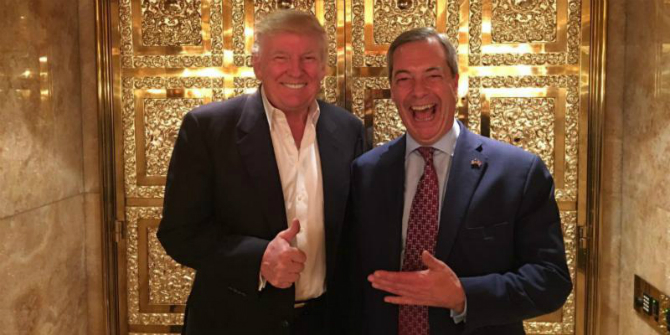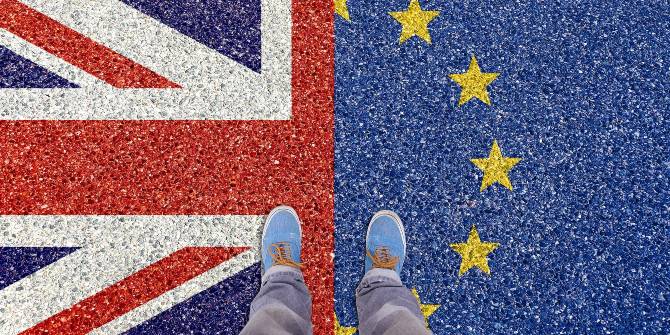
 Brexit and the election of Donald Trump are not just a test for EU leaders and institutions, they’re a test of free citizens in free societies, write Geoffrey Harris and Tim Oliver.
Brexit and the election of Donald Trump are not just a test for EU leaders and institutions, they’re a test of free citizens in free societies, write Geoffrey Harris and Tim Oliver.
For historians, Brexit and Donald Trump’s election will be the political events of 2016. Both have delivered a shock to the established political order. That shock is not confined to ‘Anglo-Saxons’, but will shape the whole of Europe and global politics.
Populism: an unstoppable tide?
The election of Donald Trump, like the Brexit vote, was unexpected and for that very reason the impact of such events has been all the greater. These were by no means unconnected events. Neither was unimaginable to careful observers. Indeed, in the spring of 2016 the future US president was the only US politician to foresee and embrace, well in advance, the importance of the referendum and with remarkable alacrity he arranged to be in the UK (albeit in Scotland, one of the parts to vote remain) as the results came in.
His meeting in Trump tower with Nigel Farage followed by the appointment of far-right ideologue Steve Bannon as his strategic adviser in the White House are most certainly confirmation that he does not intend to restrain the illiberal forces unleashed by both votes. From Marine Le Pen, Viktor Orbán to the Ku Klux Klan his success is their opportunity.
Distrust of mainstream leaders is a common theme with the next tests coming up in four of the founding members of the EU: Italy, the Netherlands, France and Germany. Circumstances in each country are quite different and it remains to be seen if alignment with Trump really is a vote-winner. For many in Europe, Trump in power may come to be more of a threat, one which could over time reduces the electoral prospects of populist parties.
Putting America first: what about Europe?
Providing mixed messages in the days after the election is not to be dismissed as floundering but as a skilful capitalisation on political opportunities. Opportunities enhanced by the fact that Trump is often dismissed as incompetent, malleable and maybe not really committed to his basic idea of “putting America first.” Handling this wilful unpredictability creates great challenges for a divided EU on the eve of divisive Brexit negotiations and at a time of external threats from Russia and ongoing migration and refugee pressures from the Middle East and North Africa.
As the triggering of Brexit negotiations comes nearer the EU27 should bear in mind that Brexit and Trump are not examples of ‘Anglo-Saxon’ distinction within Western politics, and as such something to be treated through containment and isolation.
Talk of Donald Trump and Theresa May resurrecting the alliance of Ronald Reagan and Margaret Thatcher must be taken with a big pinch of salt. Like those two political titans of the 1980s there are some similarities. Both appear to be riding similar waves: May from a Brexit vote where immigration and sovereignty seemed to have won the day; and Trump from a campaign fuelled by an often potent mix (not least one stirred up by the candidate himself) of anger and nationalism.
Like Reagan, Thatcher and the neoliberal economics they ushered in, these are not to be found only in the UK and USA. Countries elsewhere in the EU might have more comprehensive welfare systems than those in the US or UK, but that has not left them immune to the nationalism, anger and populism seen in the UK and US. The 1980s saw a wave of privatisations, deregulation and free-market economics sweep across Europe. The modern EU – with its emphasis on enterprise, deregulation and free-market economics – represents a legacy of Thatcher: far more than many might be willing to admit, not least in the UK itself.
Crisis as opportunity?
Brexit, Trump, ongoing problems in the Eurozone, tensions with Russia, and migration and refugee pressures on Schengen all make for a potentially toxic mix for the EU. Complacently seeing opportunity in what President Juncker some time ago identified as an existential crisis for the EU is unconvincing. It is, however, also too soon to surrender to apocalyptic fears. It is by no means certain that the EU will achieve a moment of crisis-induced unity many have long hoped for. It is more likely that the EU follows form and muddles through, doing enough in the Eurozone and Schengen to maintain their unity and on defence not to lose the USA. But the latter will leave a weakened but still present US commitment to NATO precariously hanging over the Union and Europe.
It will also matter for the rest of the EU that one of its leading powers now finds itself stuck between a Trump rock and a Brexit hard place. Despite hopes in the UK that Trump heralds a rebirth of the UK-US ‘Special Relationship’ there are good reasons to question whether it may now face its biggest ever test. While the historical, cultural, economic and political links that connect the UK and US are important, the core of the relationship lies in nuclear weapons, intelligence and special forces. These three areas have long been protected from the vagaries of presidential and prime ministerial relations and wider political tensions. They form the core of trust central to any relationship. Yet they may be in danger thanks to a president-elect who seems oblivious to Russian hacking, willing to bomb the families of terrorists and prepared to sanction torture.
A broader risk for Britain in general, and Theresa May’s government in particular, is that any warming in relations with the US does not compensate for a cooling of relations with the EU and with Germany. After the Brexit vote the US seemed to signal that Germany would become its main partner in Europe. Mr Trump and his inner circle seem close to those who have been dividing the Conservative Party and more respectful of Putin than Merkel. This makes for uncomfortable politics for any UK government.
 Image source: [@Nigel_Farage / Twitter]
Image source: [@Nigel_Farage / Twitter]
If the UK cannot work with the USA, then who can?
Trump is dismissive and ignorant of the EU and rude about Angela Merkel. There are huge opportunities for both Russia and China, especially in the early days of the new administration. The bombing of eastern Aleppo by the Assad forces and Russia began shortly after Putin put the phone down after his first chat with Trump. The undignified burial of the Trans Pacific Partnership has been quickly followed by signs that the Chinese geo-economic alternative for regional economic cooperation is gaining ground. The Transatlantic Trade and Investment Partnership is dead already so Trump will appear to others as not only abandoning US leadership of the west but also abandoning the main projects that Washington (Republican Congress included) had been advancing precisely to counter the rise of China.
The future of US policy in relation to Ukraine and the Baltics should be seen in this wider context. No pivot to Asia? No clear message of solidarity to Europe? Accepting that Trump is unpredictable is an optimistic approach as his rhetoric and his appointments seem clear enough. As Henry Kissinger pointed out after meeting the President-elect, the main lesson from the campaign was that Trump was remarkably consistent in his style and message even when things appeared to go badly. Now he is in power there seems little reason to expect him to change either.
Reasons for optimism
Precisely because there are so many elements of unpredictability and uncertainty there can also be reasons for optimism. Even the reasons for the Brexit and Trump victories are unclear. Identity politics, the effects of untrammelled globalisation, racism and xenophobia played their part. Younger voters did not seem attracted by Trump or the prospect of Brexit. Clinton won the popular vote in the US and in the UK 48% voted to stay in the EU.
As the consequences of each of these votes emerge it will indeed be possible to see if this really is the dying of the light of Western liberalism. If it is then it’s a death based on slim majorities. It is equally possible that the confused, uncertain and oft-contradictory reasons behind both Trump and Brexit doom both to a failure to live up to the many expectations of both.
Public opinion has surprised pollsters and mainstream leaders but it is never static. Hard questions are being asked about NATO, the European project, globalisation and free markets. They are being asked in the context of democratic societies whereas in Russia and China the suppression of dissent is the only way to ensure stability. Russia is clearly encouraging far right parties and looking to build on its established contacts in the Trump entourage. Kremlin attempts to interfere in free elections are obvious but does the FSB understand democracy.
Unpredictability can be a smart political tactic but it is also a characteristic of voters in free societies. Dangerous forces have been unleashed but an inexorable decline of the west and its values seems less than certain. Putin’s brutal suppression of dissent is not a sign of a confident regime.
A less assertive America and a European Union less blind to the threat of disintegration do not, by any means, represent an admission of the defeat of western values or sufficient reason for a lack of confidence in free societies’ ability to reform and adapt. This is a test not just for leaders and institutions. It is a test of free citizens in free societies. Just attacking the “deplorables” is not a solution.
The post gives the views of the author, not the position of LSE Brexit or the London School of Economics. It first appeared on EurActiv.
Geoffrey Harris was until June 2016 the Deputy Head of the European Parliament Liaison Office with the US Congress in Washington. He now teaches on human rights and democracy promotion at Vesalius College in Brussels and the College of Europe in Bruges.
Tim Oliver is a Dahrendorf Fellow for Europe-North American relations at London School of Economics and currently visiting Scholar at New York University’s Program in International Relations, working on Brexit issues and the US presidential election.







“Distrust of mainstream leaders” may have played a role, but overall does not seem to provide a convincing explanation for the recent events in European and US elections/referendums. Instead, if this were a major reason for Brexit, Trump, etc., why didn’t it break through any time earlier, and not under relatively worse economic conditions?
Instead, e.g. German history shows us how a wave of bad propaganda can crowd out moderate views, leaving anyone with better arguments sooner or later sidelined. We should realize that xenophobic propaganda has among certain voters the potential to stir up low-level emotions that have nothing to do with a ‘free expression of views only slightly more radical than mainstream’.
I am therefore hoping that we are not underestimating the potential threat of what might indeed be an ongoing wave of new, partly machine-generated, propaganda in social media. Perhaps we should stop trying to find rather traditional explanations for a phenomenon that might instead be the outcome of a full-blown cyberattack on Western democracies?
All the posts on this blog are very interesting, but Tim Oliver’s always stand out as especially prescient.
There is a lot of emotion on display at the moment, especially in the Western world (seen as the G7 of Western Europe, North America and Japan). This makes it very difficult to interpret the broader forces at work, with all the froth there is on the surface.
It seems to me the Western world has finally woken up to the fact that the “Decline of the West” is not the title of some early 20th Century German philosopher’s book, but an increasing ever-present reality. What to do about the rise of the BRICS countries, and the larger G20 group of countries?
Should the West retreat within itself, and adopt some of the quasi-fascist tactics of it’s opponents? Or should the West hold it’s nerve, and continue to uphold the values of “democracy, freedom, equality” as the “Age of Globalisation” approaches it’s climax?